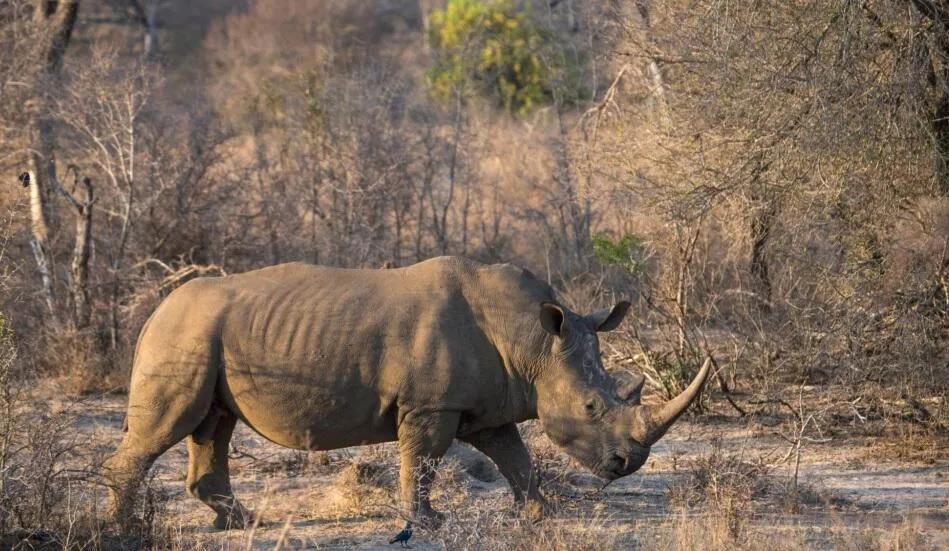Africa-Press – Botswana. The United States has not decided on adopting an official position on claims that corruption within Botswana security agencies contributes to the rise of rhino poaching in the country.
The US revealed this when commenting on a briefing document submitted by the Environmental Investigation Agency (EIA) at a recent CITES’ Standing Committee’s 74th meeting (SC74).
In its report, EIA claimed that, “corruption allegations within the agencies tasked with addressing the poaching of Botswana’s wildlife are especially concerning.”
EIA quoted the Director of the Directorate of Intelligence and Security as saying that, “poaching syndicates have infiltrated the security forces.” Citing reports from local media outlets, EIA said they “have reported on allegations of corruption within the BDF related to rhino poaching.”
Allegations of corruption have further called into question Botswana’s ability to protect its rhino population from poaching and illegal trade, the EIA said.
The US and other parties to CITES are expected to formulate official positions on some of the issues raised at the recent meeting held in Lyon, France and submit them to the nineteenth regular meeting of the Conference of the Parties to CITES (CoP19), which is scheduled to be held in Panama City, Panama, November 14-25, 2022.
Noting what it described as the worsening rhinoceros-poaching crisis in Botswana, EIA called on CITES to rein in Botswana. It also urged the United States to support decisions at CoP19 directing Botswana to strengthen its implementation of Resolution Conf. 9.14 (Rev. CoP17) on Conservation of and trade in African and Asian rhinoceroses.
The Resolution in questioncalled on state parties to redouble rhinoceros conservation efforts to stop poaching and illicit trade by state parties.
Commenting on this submission, the United States indicated that it “is currently undecided on whether to submit a document on this issue to CoP19, and we will closely follow the discussions, outcomes, and recommendations arising from SC74 and make a decision following that meeting.”
But the BDF rubbished claims by EIA.
Responding to Sunday Standard queries, BDF spokesperson Fana Maswabi stated that “Kindly note that BDF does not have any pending investigations implicating any of its members in rhino poaching incidents.”
Maswabi added that, “We would therefore like to distance ourselves from such unfounded reports.”
Maswabi further indicated that, “The BDF subscribes to tenets of Whistle Blowing Act and urges any person to come forth with any valuable information that may assist unravel issues of corruption as you purport.”
Immediate comment from the Ministry of Wildlife which is responsible for anti-poaching activities was not available.
EIA stated that none of the actions taken by Botswana have effectively addressed the root causes of the rhino poaching problem: organized crime and corruption.
“It is unclear what, if any, joint intelligence-led investigations Botswana has undertaken to dismantle the poaching and rhino horn trafficking syndicates responsible for the destruction of the Okavango Delta’s rhino population,” the report by EIA states.
It indicates that Botswana has repeatedly denied the severity of the rhino poaching situation and has failed to exhaust all opportunities to obtain assistance or information from other governments and NGOs which would augment Botswana’s intelligence capacity and improve its law enforcement strategy and effectiveness.
“In addition, NGOs and scientists who have shared information on the increase in poaching of Botswana’s wildlife, or who have offered technical assistance, have been vilified by the Government,” EIA said.
It noted that the government’s anti-poaching strategy initially focused on the application of increased military presence by the Botswana Defense Force (BDF), the lead agency conducting the anti- poaching operations in the Okavango Delta. It says the BDF employs a hardline anti-poaching policy that has resulted in the reported deaths of at least two dozen alleged poachers since 2019.6
“Many of the poachers targeting Botswana’s rhinos are from neighbouring countries such as Zambia, 7 and the BDF’s anti-poaching tactics have inflamed tensions with Botswana’s neighbours,” the EIA said in its report.
It says there is little evidence of effective co-operation with Zambia to disrupt the cross- border poaching and trafficking of wildlife.
“After the poaching continued largely unabated, the government took the drastic steps of evacuating all remaining black rhinos in the Delta (the exact number is unknown) and dehorning the white rhinos,” the report says.
It says the dehorning operation appears to have been no deterrent at preventing additional poaching.
“Reports emerged about dehorned rhinos killed by poachers,10 and in October 2021, Botswana announced a decision to capture any remaining wild rhinos and relocate them to “sanctuaries” until the security situation in the Okavango could be brought under control,” the report says.
EIA further notes that it is unclear how many rhinos Botswana managed to relocate from the Okavango Delta and whether any wild, free-roaming rhinos remain in Botswana.
According to the report, an estimated 502 rhinos, 50 black and 452 white, could be found in Botswana at the end of 2017, the last time population estimates were shared publicly. It says about half were located in the Okavango Delta region.1
Only six rhinos were reportedly poached in Botswana between 2006 and 2017, the report says.
EIA alleges that poaching began to tick upwards in 2018 before spiralling out of control in subsequent years. At least 92 rhinos were killed between January 2019 and July 2020 according to the government,4 though the true poaching figures may be significantly greater, the report says.
“No poaching Significant and sustained rhino poaching in the Okavango Delta has decimated Botswana’s wild white and black rhinos. The government has relied largely on reactionary approaches to address this poaching catastrophe that have failed to stop the killing of Botswana’s rhinos,” the report says. The report says the actual number of rhinos poached may be significantly greater. “Botswana has not released any information on the number of rhinos poached in 2021 or 2022. Compounding the crisis, Botswana has been reluctant to work with other governments and civil society to address poaching,” the report says.
For More News And Analysis About Botswana Follow Africa-Press






